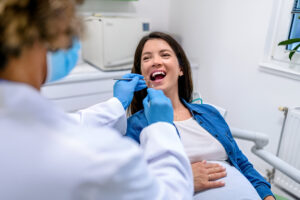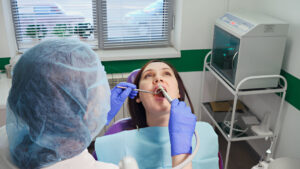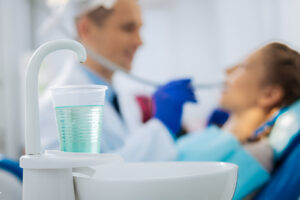When we think of cavities, we often associate them with poor oral hygiene, sugary foods, and a trip to the dentist. But many people wonder if cavities can spread from one person to another. After all, bacteria cause tooth decay, and bacteria can certainly transfer between individuals. So, is it possible for cavities to be contagious?
In this blog, najmi dental will dive into the relationship between oral bacteria and cavities, whether tooth decay can be transmitted, and how you can protect yourself and your loved ones from sharing more than just a smile.
What Causes Cavities?
Cavities are caused by tooth decay, a process where certain types of bacteria in your mouth produce acid that erodes the enamel, the hard outer layer of your teeth. When you eat sugary or starchy foods, these bacteria feed on the sugars and produce acid as a by-product. Over time, this acid wears away the enamel, leading to holes or “cavities” in your teeth.
The main culprits behind cavities are bacteria like Streptococcus mutans and Lactobacillus. These bacteria live in the plaque on your teeth and thrive in acidic environments created by sugar-rich diets.
But here’s where it gets interesting: while the bacteria that cause cavities are indeed transmissible, the cavities themselves are not directly contagious.
Can You Spread Cavity-Causing Bacteria?
Yes, you can! The bacteria that lead to cavities can be transferred from one person to another, much like the bacteria that cause a cold or the flu. In fact, studies show that cavity-causing bacteria can be passed through everyday activities such as:
- Kissing: Close contact, especially mouth-to-mouth, can transfer oral bacteria from one person to another.
- Sharing Utensils: Eating from the same spoon, fork, or even drinking from the same cup can transfer bacteria between individuals.
- Parents and Children: Parents can unknowingly pass cavity-causing bacteria to their children by testing their food with the same spoon or blowing on their food to cool it down.
Even though the bacteria themselves are transmissible, cavities don’t form overnight. Someone can transfer these bacteria to you, but whether or not you develop a cavity depends on your oral hygiene habits, diet, and other personal factors.
The Role of Saliva in Spreading Bacteria
Saliva plays a significant role in the transfer of oral bacteria. It’s in saliva where these bacteria live and multiply. When saliva is exchanged through close contact, the bacteria hitch a ride and move to the next person’s mouth. This means that activities like sharing drinks or kissing can result in the transfer of these cavity-causing organisms.
Can You Stop Bacteria from Spreading?
Although it’s difficult to avoid all exposure to oral bacteria, there are ways you can reduce the risk of spreading or receiving harmful bacteria that cause cavities. Here are a few simple precautions:
- Avoid sharing utensils, toothbrushes, or drinks, especially with children.
- If you’re a parent, be mindful of actions like blowing on food to cool it down or testing your child’s food with the same spoon.
- Keep up with regular dental check-ups to catch any signs of decay early.
Are Some People More Prone to Cavities?
While we know that the bacteria responsible for cavities can spread between people, the development of cavities depends on several factors beyond just bacteria exposure. Your oral hygiene, diet, and genetics can all affect your likelihood of developing cavities. For instance:
- Diet: A diet high in sugary or acidic foods provides the perfect environment for cavity-causing bacteria to thrive.
- Oral Hygiene: Inconsistent brushing and flossing allow plaque and bacteria to build up on your teeth, increasing your risk of decay.
- Genetics: Some people are genetically predisposed to have weaker enamel or more acidic saliva, both of which can lead to more cavities.
- Dry Mouth: People with dry mouth (also called xerostomia) have less saliva to neutralise acids, making them more susceptible to tooth decay.
So, while you may be exposed to the same bacteria as someone else, your personal habits and biology will largely determine whether or not you develop a cavity.
Preventing the Spread of Cavity-Causing Bacteria
The good news is that you can take steps to protect yourself and others from the bacteria that cause cavities. Here’s how:
1. Brush and Floss Regularly
Brushing at least twice a day and flossing daily are essential habits for maintaining a healthy mouth. These actions help remove plaque, reduce bacteria, and prevent cavities. Make sure to use fluoride toothpaste to strengthen your enamel.
2. Stay Hydrated
Saliva is your mouth’s natural defence against bacteria. Staying hydrated promotes saliva production, which helps wash away food particles and neutralises acid in your mouth. If you suffer from dry mouth, chewing sugar-free gum can stimulate saliva flow.
3. Limit Sugary and Acidic Foods
Bacteria thrive on sugar, so cutting back on sugary snacks and drinks is crucial. Acidic foods and beverages, like soft drinks and citrus fruits, can also wear down enamel, increasing your risk of cavities.
4. Visit Your Dentist Regularly
Regular dental check-ups allow your dentist to catch any signs of decay early. Professional cleanings help remove plaque build-up, and your dentist can offer treatments like fluoride applications or dental sealants to protect your teeth.
5. Use Antibacterial Mouthwash
An antibacterial mouthwash can reduce the number of harmful bacteria in your mouth, lowering your risk of developing cavities and transmitting bacteria to others.
Can You Reverse a Cavity Once It’s Started?
While early-stage tooth decay (white spots) can sometimes be reversed with fluoride treatments and improved oral hygiene, once a cavity has formed, it won’t heal on its own. That’s why it’s crucial to see your dentist as soon as you notice any signs of decay. Cavities caught early can be treated with a simple dental filling, but if left untreated, they can lead to more serious problems like root canals or even tooth loss.
Conclusion
Cavities themselves aren’t contagious, but the bacteria that cause them can certainly be passed from person to person through activities like kissing, sharing utensils, or close contact. While exposure to these bacteria is common, maintaining a proper oral hygiene routine and visiting your dentist regularly will help reduce the risk of developing cavities. By being mindful of your oral health, you can protect both your teeth and those around you from the spread of harmful bacteria. So keep brushing, flossing, and smiling – your teeth will thank you for it!


